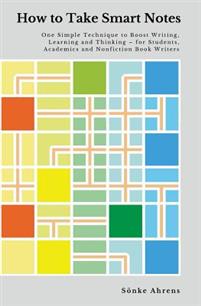Do you feel that you never have any idea or that your ideas are irrelevant or impractical? This book tells how to generate ideas by reading and taking notes!

Yet another book that Goodreads.com recommended. I always felt my notes taking is inadequate: In meetings, I often note only the irrelevant. But this is not about writing meeting minutes. It is about taking generating ideas by taking notes while reading—as the subtitle says. Good match anyway, since I am also doing research.
As a tight-fisted person, I looked at the price first, and then the age and relevance. It was recent enough (2017), available on Google Play within my budget (EUR 7.5), and relevant.
It tells about one technique: The slip-box (Zettelkasten in German). You write one note per idea, number every note, and link every note to others. As you read, you gradually create a graph of knowledge that helps generate insights. This book details how to get that rolling in three parts: It starts with an overview of the slip-box, then proposes four core principles, and finally lists six steps to successful writing.
Sönke Ahrens, the author, is a researcher in Education and Social Sciences. But the slip-box is not his creation. He attributes it to Niklas Luhmann, a very successful German philosopher, sociologist and social scientist, whose success is attributed to his zettelkasten.
I went easily through the 180 pages. I liked the many references to psychology that explain well why research and ideation difficult. Besides, S. Ahrens makes a strong case against planning and advocates instead to let the work carry us forward. Like him, I eventually dropped productivity methods like GTD or Kanban, but without finding a satisfactory alternative. On the downside, I would not reduce Luhmann’s success to his slip-box—though I had never heard of before. I think there is something else to success, otherwise, everyone with a slip-box would have written dozen of volumes.
I still give it three stars. Only time will say, but I like the general idea and I am now using a digital slip-box. Externalizing my notes helps me re-engage with them on a daily basis: A big improvement. As a next step, I am looking at other books about how we think and get ideas. What about Thinking fast and slow?
